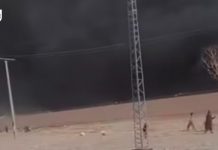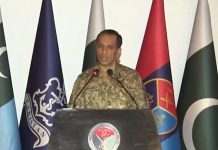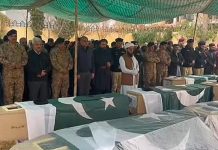LAWRENCE SELLIN
Retired Colonel, U.S. Army Reserve
The China-Pakistan Economic Corridor (CPEC), which is part of China’s larger Belt and Road Initiative (BRI), aims to connect Asia through land-based and maritime economic zones. CPEC is an infrastructure project, the backbone of which is a transportation network connecting China to the Pakistani seaports of Gwadar and Karachi located on the Arabian Sea.
Pakistan has made a different type of investment, in radical Islam, one which could become very costly to the Chinese.
At a recent conference in the Chinese city of Xiamen, the five BRICS countries – Brazil, Russia, India, China and South Africa, issued a declaration that for the first time highlighted shared concerns about terrorism from radical Islamic groups, most based in Pakistan.
Although not naming Pakistan directly, the BRICS nations listed specific Islamic terrorist organizations; the Taliban, ISIS, al- Qaida and its affiliates, including Eastern Turkistan Islamic Movement, Islamic Movement of Uzbekistan, the Haqqani network, Lashkar-e-Taiba, Jaish-e- Mohammad, Tehrik-i-Taliban Pakistan (TTP) and Hizb ut- Tahrir.
Given China’s traditional “all weather” support of Pakistan, the BRICS declaration was unprecedented and a clear signal that China considers Pakistan’s support of Islamic terrorism as a threat to its economic and geopolitical interests.
That action was undoubtedly triggered by the June 2017 kidnapping and killingof two Chinese teachers by the Islamic State affiliate Lashkar-e-Jhangvi Al-Almi (LeJ-A) in Quetta, which followed the killing of four Chinese engineers in Balochistan last year.
China condemned the kidnapping, saying it “attaches high importance to the safety of Chinese citizens overseas” and the state-run media had said the abduction “highlights risks” associated with CPEC, particularly in Balochistan, which China considers as the “center” of that effort.
Balochistan, a region rich in minerals and other natural resources that China hopes to exploit, is where the CPEC transportation network transits and ends in the southwestern city of Gwadar at the mouth of the Persian Gulf, which China is attempting to develop as a seaport and an international air cargo center, aka military bases.
Balochistan has also been the home of a festering ethnic insurgency since the partition of India in 1947, when the Baloch were promised autonomy and briefly gained independence from August 1947 to March 1948, but were then forcibly incorporated into Pakistan.
To counter ethnic separatism, Pakistan, the South Asian equivalent of Yugoslavia, has for forty years promoted the policy of “pan Islamism” as societal glue. As a result, there has been a proliferation of radical Islamic groups, both “good” and “bad” terrorists.
Pakistan’s “good terrorists” are those closely associated with the Pakistani military and its intelligence agency the ISI, such as Laskar-e-Taiba (LeT) and Jamaat-ud-Dawa (JuD), both having a strong presence in, for example, Kharan, Balochistan under Muneer Mullazai, reportedly a close associate of LeT leader Hafiz Saeed, now under house arrest in Lahore.
The “bad terrorists” are those not under the control of the Pakistani military and the ISI, extremist splinter groups like LeJ-A or those led by former ISI agents like Shafiq Mengal, who is the alleged leader of the Islamic State in Pakistan and, according to Reuters, is believed to control a Jihadi recruitment network in Pakistan and Afghanistan.
Ethnic separatism is also suppressed by the Pakistani military and the ISI by leveraging tribal rivalries or simply by hiring local criminals as enforcers. In Balochistan, government officials and the Pakistan Army Frontier Corps are supplemented by locally recruited police forces called “Levies,” whose members have been linked to off-duty extrajudicial “death squads” to eliminate government opponents and sometimes tribal rivals.
It is also the fear of Afghan nationalism that drives, at least partially, Pakistan’s support for the Taliban. With such deep-seated paranoia, it is unlikely that the Pakistani “Deep State” will forego an Islamist policy considered Pakistan’s raison d’être.
China and Pakistan are making a huge bet that economic development can coexist with the infrastructure of terrorism. Good luck with that.
Lawrence Sellin, Ph.D. is a retired US Army Reserve colonel, an IT command and control subject matter expert, trained in Arabic and Kurdish, and a veteran of Afghanistan, northern Iraq and a humanitarian mission to West Africa. He receives email at lawrence.sellin@gmail.com





























